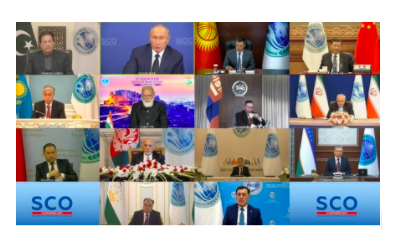Shanghai Cooperation Organization and its (SCO)PE in Afghanistan
Posted on : September 21, 2021Author : Ratnadeep Maitra

The much awaited 21st summit of the Shanghai Cooperation Organization (SCO) is upon us, albeit assuming a blended hybrid form. Conceptualized on 15th June, 2001, this Eurasian platform is focused on concerted military drills, counter-terrorism mechanisms, intelligence sharing accords, all geared to quell any security threat emanating from the nexus of terrorism, separatism and extremism. The pivotal agenda of this year’s summit will be hard to miss, especially if read in tandem with a statement released by the SCO Secretariat on 26th August, which restated the unflinching commitment of its member countries to aid Afghanistan, in forging a stabilized state, marked with tranquility and economic order, devoid of terrorism, conflicts and drug trafficking. It is thus instructive, to examine the salient points raised by the notable players in the region, and their broader implications.
Xi Jinping, president of the Asian behemoth posited that the SCO must facilitate Afghanistan to nurture an all-inclusive political apparatus, pursuing generally acceptable domestic and international stratagem. Perhaps, there was a subtle hint to the Taliban, as he reminded the “relevant parties” in Kabul to rise to the occasion and pulverize “terrorism”. Finally, in a veiled attack to America, it was argued how “certain countries” must give up on their astute roles as “instigators”. Needless to say, Beijing is simply preparing a robust diplomatic groundwork for engaging with the Taliban, having already pumped in funds to assist the militant group. The much-touted Belt and Road Initiative, which was hitherto kept out of the Afghan ambit, might find a new opening in the Graveyard of Empires, if transactional diplomacy materializes between the two countries.
The maverick cricketer-turned prime minister of Pakistan, Imran Khan avowedly stressed on how Afghanistan could not be “controlled from outside”, adding how Islamabad was selfless in supporting the war-torn neighboring nation. Interestingly, he also noted that Taliban should remain unswerving to the guarantees, they had made in the past. There was even an attempt to project Pakistan, ironically, as a victim of terror, as opposed to the global narrative of being its flagbearer. Quite unsurprisingly, Khan’s speech was not unattached to anti-India propaganda, as yet again, he broached the Kashmir problem, to garner some support. While it is well documented that, the “two inseparable brothers” Pakistan and Afghanistan, have enjoyed a time-tested relationship, the former has finally got a conducive political environment in Kabul, which it can malevolently harness in its protracted skirmish with India. Despite, facing a potential political blowback, with the mushrooming of the activities of Tehreek-i-Taliban Pakistan (TTP), majority in Islamabad, have accepted the new reality of perceiving Taliban, either as an indispensable asset, or as a necessary evil, for diffusing its control in the region.
Indian premier Narendra Modi did not mince words, when he opined how the political transition in Afghanistan was far from accommodating, having no space for consultative bargaining. The issue pertaining to the legitimacy of the new establishment came into the fora, as did the caveat of how terrorism and extremism would continue unabated, if stability was not ensured in Afghanistan, He adroitly captured the need for a “code of conduct”, to be formulated by the SCO countries, to serve as a deserving template for a global anti-terror cooperation, in future. Quite appreciably, India has attested greater importance to diplomacy to reiterate its concerns, with regard to the Taliban challenge, making the red lines clear, as to what kind of government it must guarantee. More important, being one of the biggest victims of transnational terrorism, the summit has provided a reassurance to India, that the problem is no longer seen as India-centric, and enjoys global credence, with even countries like Pakistan being forced to publicly condemn it. Finally, India has visibly not played the hard ball yet, and reasonability lies in playing the diplomatic wait and watch game from the sidelines, grabbing any opening if visible, instead of jumping the gun and strengthening the hands of its nemesis.
Russian leader Putin, was cautiously optimistic, when he broached how Russia intended to work with the Taliban, expressing a support for a United Nations conference over the Afghan problem. He also suggested the world powers, to reconsider the decision over the freezing of Afghan assets. The Russian position seems reflective of their desire to side with the Taliban, in a bid to revive their long-lost glory and power calculus in the region. However, such a lofty aim, is not free from complications, as the Russia ambassador to India, has explicitly expressed the apprehensions of Moscow, over the probable spill-over of terror to the Russian territory.
The Afghanistan imbroglio has offered an opportune moment for the SCO to rise up, to play a well-intentioned and proactive role in attending to the myriad security challenges to the region. While, the SCO must democratically pressurize the Taliban for an equitable and long-lasting power sharing arrangement, including all the relevant stakeholders, it must also preclude the Kabul soil from becoming the next safe haven for terror-mongers. In a way, while humanitarian assistance and addressal of the refugee influx, seems like the short-term goals, providing a much-needed springboard for dialogue and reconciliation, should be the broader telos. Amidst such a geopolitical conundrum, India should leave no stone unturned, in effectively operating with like-minded members, who share similar concerns about Afghanistan, while comprehensively contributing to the joint efforts of the SCO. Perhaps, only such an endeavor can transform the image of the SCO, from one that talks shop, to one that walks the talk.
Bibliography
- “China’s Xi: SCO states should help drive smooth Afghan transition” (2021). In Al Jazeera. 17th September, 2021.
- Bhattacharjee, Kallol (2021). “Political change in Afghanistan not inclusive: Modi”. In The Hindu. 18th September, 2021.
- “Afghanistan can’t be ‘controlled from outside’: Pak PM Khan at SCO summit” (2021). In The Hindu. 17th September, 2021.
- Raja Mohan, C (2021). “Can Shanghai Cooperation Organisation be the regional body that stabilizes Afghanistan?”. In The Indian EXPRESS. 15th September.
- “Putin says Russia needs to work with the Taliban” (2021). In REUTERS. 17th September.
(https://www.reuters.com/world/europe/putin-says-russia-needs-work-with-taliban-2021-09-17/)
- “SCO begins in Dushanbe: How this eight-member body can help shape Afghanistan’s future (2021). In Firstpost. 17th September.
- Standish, Reid (2021). “China in Eurasia Briefing: Beijing’s Leadership Gets Put To The Test At The SCO.” In CHINA IN EURASIA. 15th September.
(https://www.rferl.org/a/china-in-eurasia-shanghai-cooperation-organization/31460902.html)
Ratnadeep Maitra
Intern, Asia in Global Affairs
(The views, thoughts, and opinions expressed in the text belong solely to the author.)





Leave a Reply